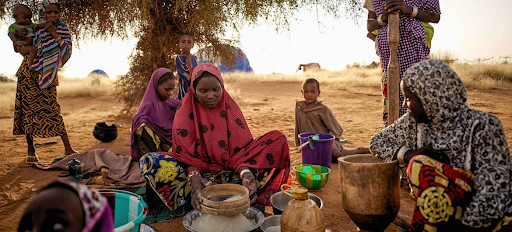Humanitarian Actors Launch $686 Million Aid Appeal For Mali
The Humanitarian Response Plan hopes to strengthen the resilience capacities of at least 80 per cent of Malians in at least 75 per cent of regions to cope with shocks, reduce vulnerabilities, and improve livelihood strategies and disaster preparedness by the end of 2022 .

Humanitarian groups including the United Nations are seeking $686 million from donors to help 5.3 million of the most vulnerable people in Mali amid insurgency and increased violence.
Since 2012, the country has been facing a series of security setbacks, including military coups, renewed fighting between government forces and Tuareg rebels, and the seizure of much of the territory in the north and central regions by radical extremists.
The deteriorating security situation has created a humanitarian crisis with the level of needs higher than any point since 2012, according to Alain Noudehou, the UN Humanitarian Coordinator in Mali.
Some 7.5 million people are in need of assistance in 2022, the Humanitarian Response Plan, launched on Monday, Feb. 14, revealed.
The Plan aims to assist the 5.3 million vulnerable population in the areas of education, food, health, protection, shelter, water, sanitation and hygiene.
This is coming as the country faces economic blockades, driven by both European countries and the Economic Community of West African States (ECOWAS) in protest against the ruling military junta.
More than 1.8 million people will expectedly need food assistance in the upcoming lean season (between June and August), compared to 1.3 million in 2021, the highest level of food insecurity recorded since 2014, according to the World Food Programme.
The prevalence of food insecurity is very high in the regions of Gao (60 per cent), Mopti (50 per cent), Timbuktu (30 per cent) and Segou (20 per cent) where humanitarian access has remained extremely constrained as a result of the activity of armed groups.
Armed groups affiliated with the Islamic State (ISIS) have mounted roadblocks and destroyed road infrastructure and telecommunication networks, crippling aid delivery to the regions, according to the Humanitarian Access Overview 2021 by ACAPS, a project overseen by Mercy Corps, the Norwegian Refugee Council, and Save the Children International.
Call for action
Despite the challenges, Noudehou said humanitarian and development actions must not stop just as the Malian government pushed for the resettlement of the displaced and refugee populations to reduce their dependence on humanitarian aid.
“It is necessary to continue to strengthen durable solutions initiatives and ensure better coordination between humanitarian, development and peacebuilding actions to better address needs and for the resilience of communities in conflict or post-conflict areas,” he said in a statement on Wednesday, Feb. 16.
Without urgent and flexible funding, he explained that the humanitarian situation risks exacerbating the fragility and needs of vulnerable women, girls, boys and men.
“For example, the nutrition of over 959,000 children, including 247,000 children suffering from severe acute malnutrition and 712,000 children under 5 suffering from moderate acute malnutrition, will be interrupted,” he added.
Mali was one of the 10 least funded Humanitarian Response Plans in 2021.

In 2021, the country’s humanitarian community received $215 million out of the $563 million requested, equivalent to 38 per cent of the sought funds.
Oumarou Diarra, the delegated Minister of Health and Social Development in charge of Humanitarian Action, Solidarity, Refugees and Displaced Persons, said that “the commitment of implementing partners who access the vulnerable people who are in difficult conditions, sometimes at the risk of their lives, is welcomed.”
Support Our Journalism
There are millions of ordinary people affected by conflict in Africa whose stories are missing in the mainstream media. HumAngle is determined to tell those challenging and under-reported stories, hoping that the people impacted by these conflicts will find the safety and security they deserve.
To ensure that we continue to provide public service coverage, we have a small favour to ask you. We want you to be part of our journalistic endeavour by contributing a token to us.
Your donation will further promote a robust, free, and independent media.
Donate HereStay Closer To The Stories That Matter




